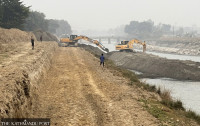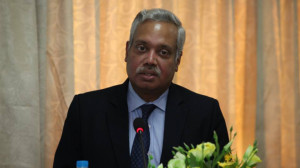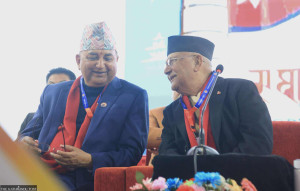National
MoH to set up 10 urban health promotion centres
The Ministry of Health (MoH) has decided to establish urban health promotion centres at various locations in Kathmandu district as a pilot project to promote healthy behaviours and inspect quality of food, meat and water.
The Ministry of Health (MoH) has decided to establish urban health promotion centres at various locations in Kathmandu district as a pilot project to promote healthy behaviours and inspect quality of food, meat and water.
The MoH has been holding a series of discussions with the Kathmandu Metropolitan City and other stakeholders to set up such centres at 10 locations in the district.
Officials have come up with a list of activities that the promotion centres will conduct.
Public health inspection, disseminating information about non-communicable disease and provide basic laboratory tests on some listed tests are some of the activities that the officials are considering. Public health inspection will comprise inspection of food, meat and water quality.
“The centres will also provide services on adolescent and reproductive health,” said District Public Health Officer Mahendra Shrestha.
According to Shrestha, of the 15,300 registered abortions in 2015, around 30 percent were done on girls below 20 years of age. Hence, there is a need for counselling on sexual and reproductive health, said Shrestha.
A team led by Shrestha has already visited various urban health clinics and other health centres and is finalising the facilities where such health promotion centres can be based.
The recent move of the MoH comes amid global effort to focus particularly on urban cities.
According to the World Health Organisation, more than 70 percent of the world’s population will be living in cities by 2050.
Cities are facing a triple threat—infectious diseases like HIV/AIDS, tuberculosis, pneumonia and diarrhoeal diseases; non-communicable diseases like asthma, heart disease, cancer and diabetes; and violence and injuries, says the WHO.
Many studies have shown that children of the poorest urban quintile are more likely to be malnourished than those in rural areas while they even lack basic health services.
“There is no denying that population of urban poor is increasing rapidly. People living in slums and the poor face more problems accessing basic health services in cities than in the rural areas,” said Dr Sushil Baral, a public health expert.
Dr Baral, however, said the government has to cautiously plan the execution of the centres at a time when the performance of Urban Health Clinics established in many parts of the cities has not been up to the mark.
Twenty-seven urban health clinics are being run by the Kathmandu Metropolitan City. But not many people are aware of the services.
Lack of adequate human resources and coordination among government agencies has affected the services of urban health clinics.
“The government should ensure that the promotion centre should have at least an MBBS doctor and nursing staff and they should be able to deliver basic health services as defined by the government,” said Dr Baral.
In the new Nepal Health Sector Strategy 2015-2020, immunizations; management of pneumonia, malaria, diarrhoea, measles, malnutrition, ear infection, neonatal infection in children; treatment for urinary tract infection and rural tract infection and epilepsy among others have been defined as basic health services.




 13.12°C Kathmandu
13.12°C Kathmandu














